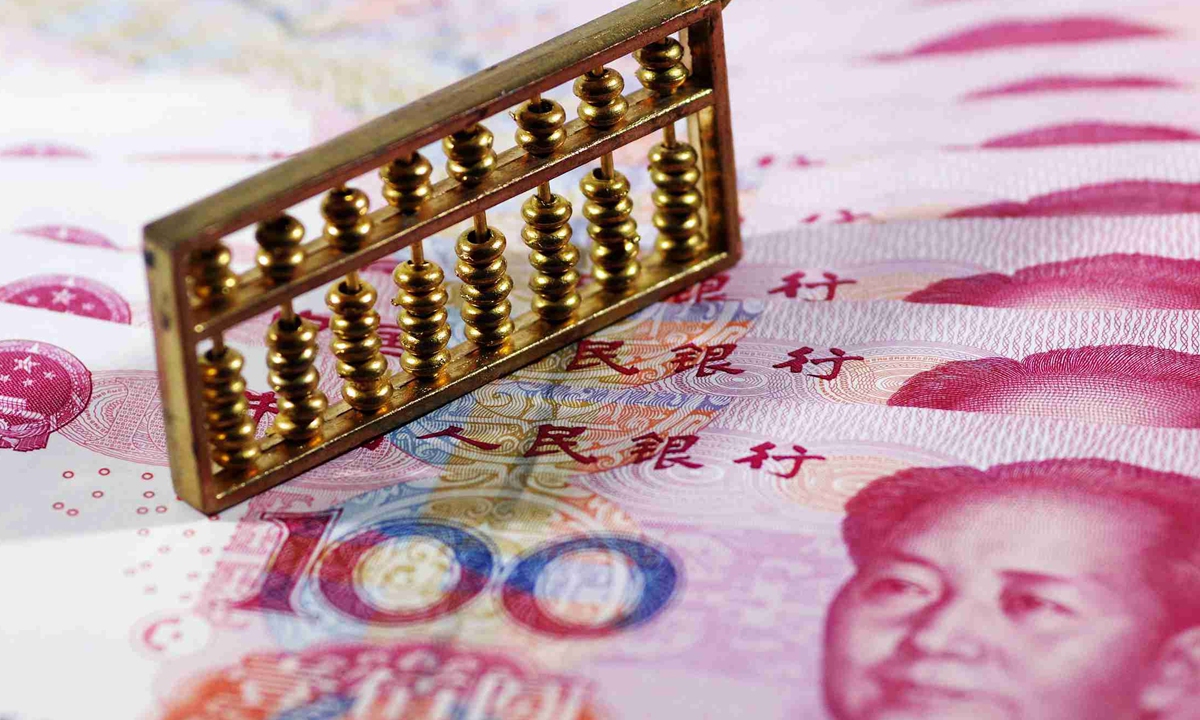
Chinese yuan Photo:VCG
Chinese lawmakers have approved a State Council bill on raising the ceiling on local government debt by 6 trillion yuan ($838 billion) to replace existing hidden debts, according to a press conference Friday.
Amid a series of fiscal and financial policy measures and sound economic indicators recorded recently, economists and foreign financial institutions are upbeat about China's ability to achieve its full-year economic and social development goals.
Xu Hongcai, deputy head of the financial and economic affairs committee of the National People's Congress, China's top legislature, revealed the approval to the media after the Standing Committee of the 14th NPC concluded its 12th session in Beijing on Friday.
Under the new arrangement, the debt ceiling for special local government debt will be increased to 35.52 trillion yuan from 29.52 trillion yuan by the end of 2024, Xu said.
Also starting from 2024, China will set aside 800 billion yuan from each year's new special-purpose bonds for local governments for five consecutive years, thereby providing debt relief to replace 4 trillion yuan of hidden debts, according to Minister of Finance Lan Fo'an.
The new measures will add a combined 10 trillion yuan to China's debt relief resources, Lan told the press conference. As a result, the amount of hidden debts that China's local governments need to deal with by 2028 is expected to drop from 14.3 trillion yuan to 2.3 trillion yuan, said the minister.
Due to the statutory debt interest rates being significantly lower than the hidden debt interest rates, it is estimated that the latest arrangements will save local governments 600 billion yuan in interest payments on a five-year, accumulative basis, Lan said.
"As part of a package of fiscal policy measures to strengthen counter-cyclical adjustments, the new policy will actively contribute to the healthy development of China's economy," Xi Junyang, a professor at the Shanghai University of Finance and Economics, told the Global Times on Friday.
While easing local governments' pressure to dissolve hidden debt risks and reduce their interest expense, the debt swap will ensure that local governments have more fiscal resources to support investment, consumption and sci-tech innovations for stable economic growth and structure adjustment, according to Xi Junyang.
There remains considerable room for China's central finance to issue debts and expand deficit, Lan said, noting that the ministry is considering potential fiscal policies to strengthen counter-cyclical adjustments.
Lan said the ministry will soon roll out tax policies to support the healthy development of the real estate market, while efforts are also being made to boost the issuance of special treasury bonds to support large state-owned commercial banks in replenishing the core tier-1 capital.
The Ministry of Finance's fiscal policies came amid a slew of broad policy measures announced by Chinese policymakers in recent months targeting different sectors of the economy, such as the foreign trade, housing market and the stock market.
Policy package to boost confidence
A State Council executive meeting on Friday reviewed and passed measures on promoting the stable growth of foreign trade and stabilizing economic growth. The meeting called for effectively promoting foreign trade growth, ramping up financial support such as expanding the scale of export credit insurance and better tapping policy loans for small and micro foreign trade enterprises to support the sustained and positive growth of the economy.
In late September, China's financial authorities announced a broader-than-expected policy package to galvanize the economy's recovery. These policy measures include reducing the reserve requirement ratio (RRR) for banks and mortgage rates for existing homes, as well as introducing new monetary programs to boost the capital market, among other initiatives.
Tian Yun, an economist based in Beijing, told the Global Times that the moves highlight the Chinese central government's firm resolve and strong capacity to promote stable economic expansion in the rest of the year.
Along with the implementation of a package of incremental policies and the coordinated policies continuing to produce effects, China's economy will consolidate its growth momentum in the fourth quarter, contributing to the achievement of full-year economic and social development goals, Wen Bin, chief economist at China Minsheng Bank, told the Global Times on Friday.
Driven by supportive policies, China's merchandise trade grew by 4.6 percent year-on-year in October alone in yuan-denominated terms, an increase of 3.9 percentage points from the September rate, according to data released by the General Administration of Customs on Thursday.
Additionally, the purchasing managers' index (PMI) for China's manufacturing sector came in at 50.1 in October, up from 49.8 in September and surpassing the boom-or-bust line of 50 for the first time since May, according to the National Bureau of Statistics.
China's incremental policies, along with improving economic indicators, have prompted foreign financial institutions to be more bullish about China's economic prospects and the market.
"We at DBS are confident in the long-term growth of the Chinese economy. China's large market size, innovative business model, and strong execution capabilities provide a solid foundation for sustained growth. Our decision to increase our investment in China is a testament to our belief in its economic future," DBS China told the Global Times.


